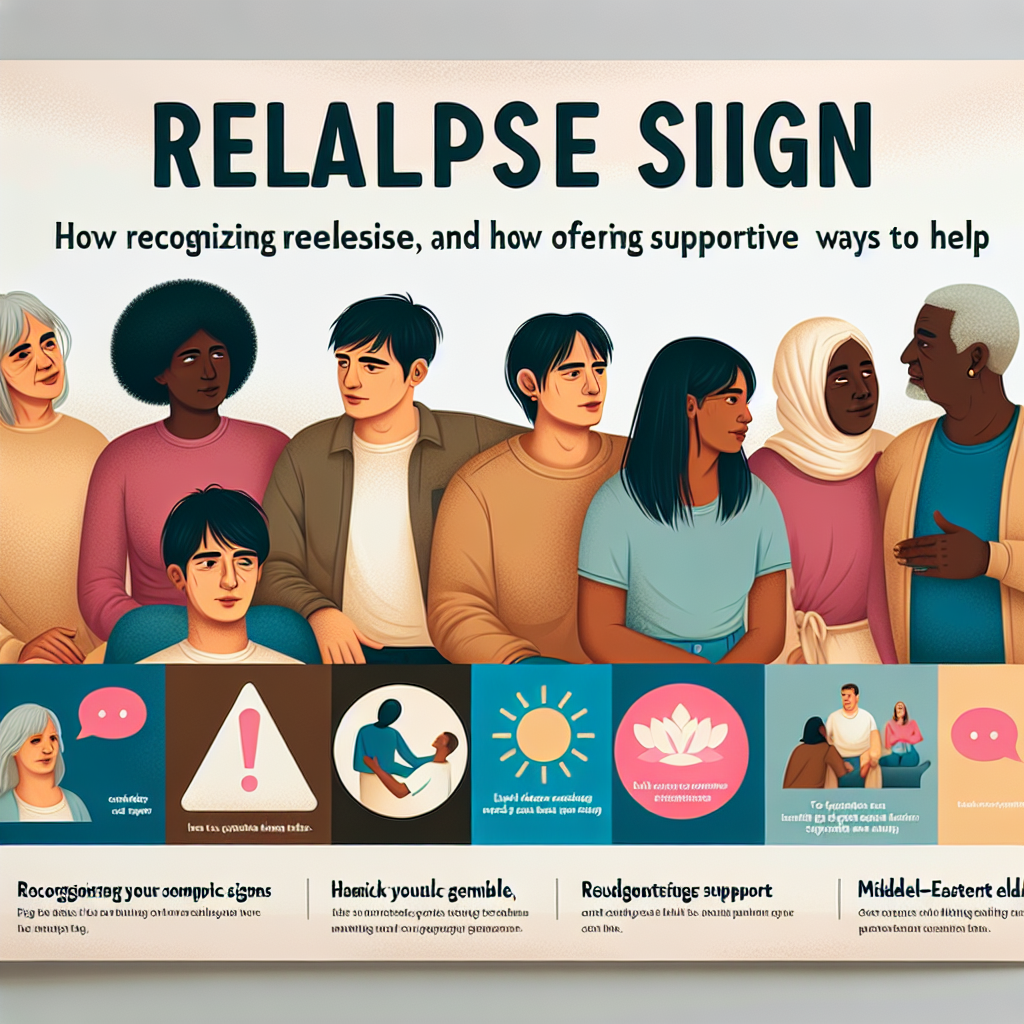-
Table of Contents

“Spotting Relapse: Empower Families to Support with Compassion, Not Criticism”
Introduction
Recognizing Relapse Signs: How Families Can Help Without Judgment
Relapse is a common and challenging aspect of the recovery journey for individuals overcoming addiction. For families, understanding and identifying the early signs of relapse can be crucial in providing timely and effective support. However, offering this support without judgment is essential to foster a safe and encouraging environment for the individual in recovery. This guide aims to equip families with the knowledge to recognize relapse indicators and the strategies to assist their loved ones compassionately and constructively, ensuring that the path to recovery remains as smooth and supportive as possible.
Identifying Early Warning Signs of Relapse: A Guide for Families
Recognizing the early warning signs of relapse in a loved one can be a challenging yet crucial task for families. Understanding these signs and knowing how to respond can make a significant difference in the recovery journey. It is essential to approach this sensitive issue with empathy and without judgment, as the support of family members can be a powerful force in preventing a full-blown relapse.
One of the first indicators of a potential relapse is a change in behavior. This might manifest as increased irritability, withdrawal from social activities, or a sudden lack of interest in hobbies and responsibilities. These changes can be subtle at first, but they often escalate if not addressed. Families should pay close attention to these shifts, as they can be early signs that their loved one is struggling.
Another critical warning sign is the re-emergence of old habits. This could include reconnecting with friends who were part of their past substance use or revisiting places associated with their addiction. These actions can be a red flag that the individual is reminiscing about their past behavior and might be at risk of slipping back into it. Families should gently encourage their loved one to engage in new, healthy activities and build a supportive network that reinforces their commitment to recovery.
Emotional changes are also significant indicators of a potential relapse. Feelings of hopelessness, anxiety, or depression can often precede a relapse. It is important for families to create an open and non-judgmental environment where their loved one feels safe to express their emotions. Encouraging open communication can help identify these emotional shifts early and provide an opportunity for intervention before the situation worsens.
Physical signs should not be overlooked either. Changes in sleep patterns, appetite, or personal hygiene can all be indicators that something is amiss. These physical symptoms often accompany emotional and behavioral changes, creating a comprehensive picture of the individual’s state of mind. Families should approach these observations with care, offering support rather than criticism, to help their loved one feel understood and valued.
In addition to recognizing these signs, it is equally important for families to know how to respond effectively. The key is to offer support without judgment. This means avoiding blame or criticism, which can lead to feelings of shame and further isolate the individual. Instead, families should focus on expressing concern and offering help. Phrases like “I’m worried about you” or “How can I support you?” can open the door to a constructive conversation.
Moreover, families should educate themselves about the nature of addiction and relapse. Understanding that relapse is often a part of the recovery process can help reduce feelings of frustration and disappointment. It is important to remember that relapse does not mean failure; it is an opportunity to learn and strengthen the recovery plan. By approaching the situation with compassion and knowledge, families can provide the necessary support to help their loved one navigate this challenging time.
In conclusion, recognizing the early warning signs of relapse and responding with empathy and support can make a significant difference in a loved one’s recovery journey. By paying attention to behavioral, emotional, and physical changes, families can intervene early and offer the help needed to prevent a full-blown relapse. Creating a non-judgmental and supportive environment is crucial, as it encourages open communication and fosters a sense of safety and understanding. Through education and compassionate support, families can play a vital role in helping their loved ones maintain their commitment to recovery.
Supporting a Loved One Through Relapse: Strategies for Non-Judgmental Assistance
Supporting a loved one through relapse can be a challenging and emotional journey, but it is crucial to approach the situation with empathy and understanding. Recognizing the signs of relapse early can make a significant difference in providing timely and effective support. Families play a pivotal role in this process, and their approach can either facilitate recovery or inadvertently contribute to further struggles. Therefore, it is essential to offer assistance without judgment, fostering an environment where the individual feels safe and supported.
One of the first steps in recognizing relapse signs is to be aware of the behavioral and emotional changes that may indicate a return to old habits. These can include increased secrecy, withdrawal from social activities, changes in mood, and neglect of responsibilities. Physical signs such as changes in appearance, sleep patterns, or appetite can also be telling. By staying attuned to these indicators, families can intervene early, potentially preventing a full-blown relapse.
However, recognizing these signs is only the beginning. The manner in which families respond is equally important. It is natural to feel a range of emotions, from disappointment to fear, but expressing these feelings in a judgmental way can be counterproductive. Instead, it is vital to approach the situation with compassion and a willingness to listen. Open, non-confrontational communication can help the individual feel understood and less isolated, which is crucial for their recovery journey.
Moreover, it is beneficial to educate oneself about the nature of addiction and relapse. Understanding that relapse is often a part of the recovery process can help families maintain a supportive stance. Addiction is a chronic condition, and setbacks do not signify failure but rather an opportunity to learn and grow. By viewing relapse through this lens, families can offer encouragement and hope, reinforcing the idea that recovery is still possible.
In addition to emotional support, practical assistance can also be invaluable. This might involve helping the individual access professional resources such as therapists, support groups, or rehabilitation programs. Encouraging healthy routines, such as regular exercise, balanced nutrition, and adequate sleep, can also support their overall well-being. Furthermore, creating a stable and stress-free home environment can reduce triggers that may lead to relapse.
It is also important for families to set healthy boundaries. While offering support, it is essential to avoid enabling behaviors that may perpetuate the addiction. This can be a delicate balance, but clear communication about expectations and consequences can help maintain a supportive yet firm stance. Seeking guidance from professionals, such as family therapists or counselors, can provide strategies for setting these boundaries effectively.
Lastly, self-care for family members is crucial. Supporting a loved one through relapse can be emotionally taxing, and it is important to ensure that one’s own mental and emotional health is not neglected. Engaging in activities that bring joy, seeking support from friends or support groups, and possibly even professional counseling can help family members maintain their own well-being.
In conclusion, recognizing relapse signs and offering non-judgmental assistance requires a combination of awareness, empathy, education, and practical support. By fostering an environment of understanding and compassion, families can play a crucial role in their loved one’s recovery journey. While the path may be fraught with challenges, the unwavering support of family can provide the strength and hope needed to navigate through relapse and towards sustained recovery.
Q&A
1. **Question:** What are some common signs of relapse that families should be aware of?
**Answer:** Common signs of relapse include changes in behavior or mood, withdrawal from social activities, neglecting responsibilities, and returning to old habits or environments associated with substance use.
2. **Question:** How can families support a loved one showing signs of relapse without being judgmental?
**Answer:** Families can support a loved one by maintaining open and non-confrontational communication, offering emotional support, encouraging them to seek professional help, and participating in family therapy or support groups.
Conclusion
Recognizing relapse signs in a loved one struggling with addiction is crucial for timely intervention and support. Families can play a pivotal role by educating themselves about the common indicators of relapse, such as changes in behavior, mood swings, and withdrawal from social activities. It’s essential for family members to approach the situation with empathy and without judgment, fostering an environment of trust and open communication. By offering support and understanding rather than criticism, families can help their loved ones feel safe to seek help and discuss their struggles, ultimately aiding in their recovery journey.



